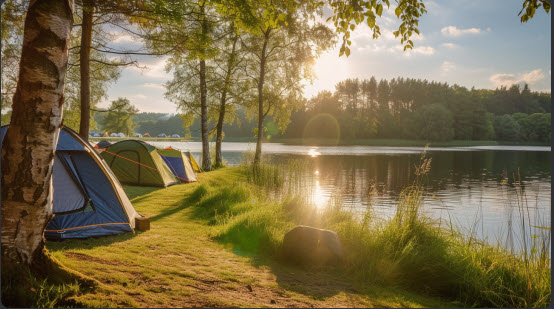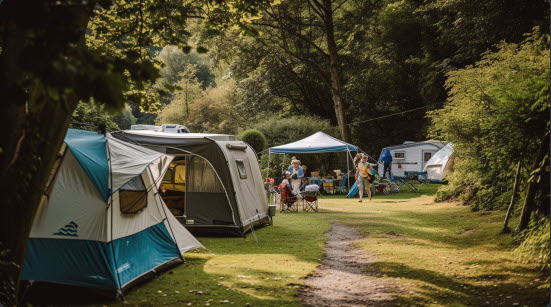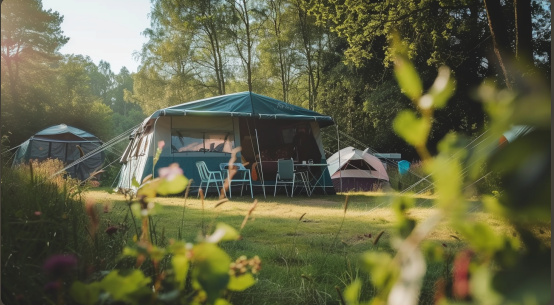Discover the numerous physical, mental, and social benefits of camping, including improved mental health, increased physical activity, and the opportunity for social connections and skill-building.
Table of Contents
The Benefits of Being in the Great Outdoors
Camping offers a plethora of benefits for individuals of all ages, encompassing physical health, mental well-being, social connections, skill-building, and stress reduction. The experience of camping allows people to disconnect from the hustle and bustle of daily life and immerse themselves in nature, reaping the rewards of outdoor living. From exposure to green spaces to engaging in outdoor activities, camping provides a holistic approach to improving overall health and wellness. And of course, it can be a cheap holiday compared to a hotel or guest house. (Mind you, savvy campsite owners are catching onto this swing towards camping as a cheap holiday, and are putting their prices up).

In addition to the physical health benefits of camping, the mental health advantages are equally significant. For instance, camping can act as a powerful remedy for stress and anxiety, offering individuals a chance to unwind in a serene natural environment away from the pressures of modern life. Furthermore, waking up with the natural light at dawn during a camping trip can help reset the body clock, leading to healthier sleep patterns and improved overall well-being.
This connection with nature and the elements plays a vital role in promoting mindfulness and encouraging individuals to be present ‘in the moment’, fostering a sense of tranquillity and mental clarity.
Moreover, camping isn’t just about personal health; it also facilitates the building of social connections and relationships. Whether it’s spending quality time with family around a campfire, engaging in communal activities like cooking meals together, or partaking in team sports, camping provides ample opportunities for bonding and shared experiences. These social interactions not only enhance relationships but also contribute to a sense of community and overall well-being, making camping a holistic and fulfilling experience for all involved.

Camping provides an unparalleled opportunity to immerse oneself in the beauty of nature, offering a profound connection that can rejuvenate the mind and body. Exposure to green spaces during camping has been linked to numerous mental health benefits, such as reduced stress levels and increased feelings of calmness and relaxation. Moreover, spending time outdoors while camping allows individuals
to bask in natural sunlight, a vital source of vitamin D that supports immune function and overall health. For instance, waking up to the gentle rays of the sun during a camping trip not only helps reset your body clock for better sleep patterns but also invigorates the senses, creating a harmonious bond with the environment. You really need to try it – it could be the tonic or ‘pick me up’ that you are looking for!
In addition to the mental and physical benefits, camping in picturesque locations like the Lake District and Peak District offers a sensory feast for nature enthusiasts. These areas are renowned for their pristine landscapes, crystal-clear lakes, and lush forests, providing campers with a chance to escape the hustle and bustle of urban life and embrace the tranquillity of the great outdoors.
The serene ambiance of such locations can inspire a deep appreciation for the natural world, encouraging individuals to adopt a more eco-conscious mindset and develop a profound respect for the environment. Ultimately, the connection with nature forged through camping experiences serves as a powerful reminder of the beauty and importance of the natural world in enhancing our well-being and nurturing our souls.
Physical Health Benefits of Camping
Engaging in camping activities contributes significantly to physical health by increasing daily activity levels and promoting overall well-being. Outdoor pursuits such as walking in forests and hiking not only elevate mood and focus but also enhance cognitive capacity. Moreover, exposure to natural environments during camping helps reduce depressive thoughts and establish a healthy sleep routine, crucial for a well-rested body and mind. Camping near lakes or rivers for example offers additional health benefits, providing a serene setting for relaxation and rejuvenation.
Camping also presents unique opportunities for physical exercise in a natural setting, away from the constraints of indoor spaces. For example, activities like kayaking in tranquil lakes or cycling through forest trails not only provide a cardiovascular workout but also allow campers to connect with nature. Additionally, the fresh air and oxygen-rich environment in camping locations contribute to improved respiratory health and overall vitality. Research has shown that spending time outdoors, as promoted by camping, can lead to a strengthened immune system and increased energy levels.
Furthermore, the physical demands of setting up camp, such as pitching tents and gathering firewood, engage different muscle groups and promote physical strength and endurance. These activities not only serve as practical skills for campers but also contribute to a more active lifestyle overall. The combination of physical exertion, exposure to natural elements, and a break from sedentary routines during camping trips can have lasting positive effects on one’s physical health and well-being.
Are There Benefits to Your Mental Health?
Camping not only offers physical health benefits but also has a profound impact on mental well-being. The immersive experience of camping allows individuals to disconnect from the hustle and bustle of daily life, providing a much-needed break from the stress and anxiety that often accompany modern living. Surrounded by the tranquillity of nature, campers can find solace and rejuvenate their mental state, leading to increased levels of happiness and overall well-being.
In addition to the emotional benefits, camping plays a vital role in improving sleep quality. By escaping the exposure to digital screens and city noises, campers can reset their body clocks, promoting healthier sleep patterns. (Leave your phone charger at home – I dare you…)
Waking up to natural light at dawn during a camping trip not only helps in regulating sleep but also enhances the overall mental well-being of individuals, contributing to a sense of inner peace and relaxation. This unique opportunity to recalibrate one’s sleep cycle in natural surroundings is a valuable aspect of camping that directly positively impacts mental health.
Social Benefits
Camping is not just about physical and mental well-being; it also provides a wealth of social advantages. When individuals camp together, the communal aspect of the experience fosters strong social connections and shared moments, which in turn can strengthen relationships and boost overall well-being. For example, camping trips often involve communal activities such as cooking meals together over a campfire or engaging in team sports, allowing campers to bond and create lasting memories.
Moreover, the pastime offers a unique environment for campers to engage in a diverse range of outdoor activities as a group, encouraging teamwork and camaraderie among participants. These shared experiences can create a sense of unity and belonging, making camping not only a rejuvenating escape into nature but also a platform for building and nurturing social relationships. By spending quality time with loved ones in the great outdoors, campers can forge deeper connections and enjoy the benefits of meaningful social interactions that can last well beyond the camping trip.

A tent holiday is not just about enjoying the outdoors; it also serves as a valuable platform for skill-building and promoting self-reliance. When individuals immerse themselves in camping experiences, they learn to appreciate the simplicity of nature and embrace the “less is more” philosophy, gaining a deeper understanding of what truly matters in life. For example, setting up a campsite from scratch teaches campers the importance of resourcefulness and adaptability, skills that are transferable to many aspects of life beyond the camping trip.
In addition to fostering an appreciation for simplicity, camping offers unique educational opportunities for children. By engaging in outdoor activities like setting up a tent, cooking meals over a campfire, or reading a map to navigate the surroundings, children develop essential skills that promote self-confidence and independence. These hands-on experiences not only enhance their practical knowledge but also instill a sense of accomplishment and resilience as they overcome challenges in the natural environment. For instance, when children successfully build a shelter using natural materials found in the wilderness, they not only learn survival skills but also boost their problem-solving abilities, preparing them for real-world situations.
If you need any further information or assistance with this article, don’t hesitate to Contact Us

















